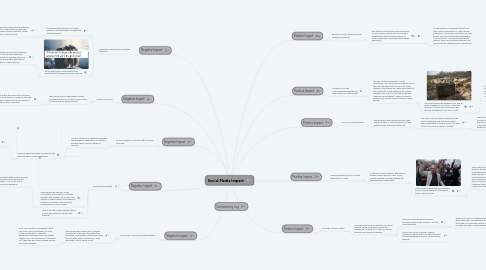
1. Negative Impact
1.1. Glamorizes substance abuse/mental illness/etc
1.1.1. Clothing designers/stores use "witty" slogans as romanticization of legitimate mental disorders
1.1.1.1. This evidence provides more examples of outrageous clothing choices, and how merchandising mental illness(es) further stigmatizes victims of them.
1.1.2. Online users often create media (blog posts/pictures) idealizing negative feelings
1.1.2.1. This article brings up the fair point of how seeing posts such as these detriment peoples' attempts to seek help, and give them the false illusion that what they're going through is a "tragic art form".
2. Negative Impact
2.1. Ignorance and bigotry
2.1.1. Although strictly legal due to the Constitution's stipulation of "religious freedom" and "freedom of speech", the Westboro Baptist Church is renowned in creating controversy, specifically its condemning of LGBT+ people.
2.1.1.1. While people are entitled to their opinions, self-righteousness never works out in anyone's behalf; it can incite acts of violence and social repression.
2.1.2. Here is the link to their website (which contains a plethora of satirize-able material)
3. Negative Impact
3.1. Invasion of privacy
3.1.1. The Internet Privacy Regulation provides cooperations the free control of users' data (of which arises dubious actions).
3.1.1.1. This NPR article discusses the crux that is freedom in exchange for freedom, and how we might be risking more of the former in exchange for less of the latter
4. Negative Impact
4.1. Tensions between countries and/or groups of people
4.1.1. The most obvious of examples would be the President's dependency on Twitter, and how that is used as fodder for tensions.
4.1.1.1. Here is a Tweet he posted in regards to the testy situation of mass destruction
4.1.1.1.1. This USA Today article touches base on Kim Jong Un's reaction to Trump's online outrage, and why exactly it matters
5. Negative Impact
5.1. False sense of connection/desentization
5.1.1. Social media has numbed us to violence, and outcries of disaster (sometimes) go unnoticed, such as the unsung victims that are lost in the wake of tragedy (i.e. mass shootings, such as Sandy Hook)
5.1.1.1. From /The Practice of Everyday (Media) Life: From Mass Consumption to Mass Cultural Production/, "academic discussions often stay away from asking certain basic critical questions" (Manovich 321). When we don't use empathy, we also lose critical thinking.
6. Commentary Log
7. Positive Impact
7.1. Promotion of niche communities/businesses/etc (specifically art-related ones)
7.1.1. Because I'm very immersed in the art community, I will use myself as evidence to say that the new generation thrives in its online presence; artists have the ready applications to get noticed (i.e. social platforms like Twitter, Instagram, etc but also sites that invite their creations like ArtStation), which can lead to employment, or even more prominent roles in society.
7.1.1.1. This article details the benefits of art, and to quote a phrase from it, art can, "make the world felt. And this felt feeling may spur thinking, engagement, and even action".
7.1.1.1.1. In summary, art is imperative in that not only it provides perspectives in a non-invasive form, it allows people to come to their own conclusions. It pieces together an unbiased narrative.
8. Positive Impact
8.1. Education and its general tools for academic prosperity
8.1.1. This article talks about the several benefits of social media, such as how it advocates collaboration and its implementation in school curriculum (more particularly higher education).
8.1.1.1. In /The Practice of Everyday (Media) Life: From Mass Consumption to Mass Cultural Production/, "Strategies and tactics are now closely linked in an interactive relationship..." (Manovich 323). If tools are implemented properly, they can effectively educate, and give people the starting point in doing more.
9. Positive Impact
9.1. Advocacy/wider branch of output (ethicacies of voice)
9.1.1. A branch of communication, the Internet enables users' individual voice, and in numbers people can evoke change (by expressing discontentment).
9.1.1.1. Social media accelerated the uprising in Egypt, putting pressure on the global world to get involved.
9.1.1.1.1. Social media in this situation demanded peoples' attention, and while it cannot do everything without a voice, it can give people power. The government and people equally can be ignorant, but even less so when topics become unavoidable due to insurmountable evidence. (Although they do have remarkable talent in doing so anyway).
10. Positive Impact
10.1. Funding of "noble" causes
10.1.1. Sites like GoFundMe, Kickstarter, Patreon all support people who need financial aid, whether be for projects or cases of natural disasters and personal tragedies.
10.1.1.1. This is a link directing to the official fundraiser page for the victims of the Las Vegas shooting.
10.1.1.1.1. There's not much of "evidence" that can be given other than both examples provide literal help to people who need it; what else is better than that? Helping people is good!
10.1.1.2. Here's a link to the 'discover' page on Kickstarter, where many innovative/creative projects designed by people, for people are featured.
11. Positive Impact
11.1. Access of communication
11.1.1. The Internet's most obvious benefit is the grander access of communication, and the ability to relay information with ease.
11.1.1.1. This article lists the specific example of the Nepal earthquake, and how social media helps significantly in finding victims (i.e. with location tracking on peoples' devices).
11.1.1.1.1. The positive social impact of this is quite obvious; we are becoming more engaged in the lives of strangers'--we can do the "impossible". People can be physically helped, as well as emotionally.
